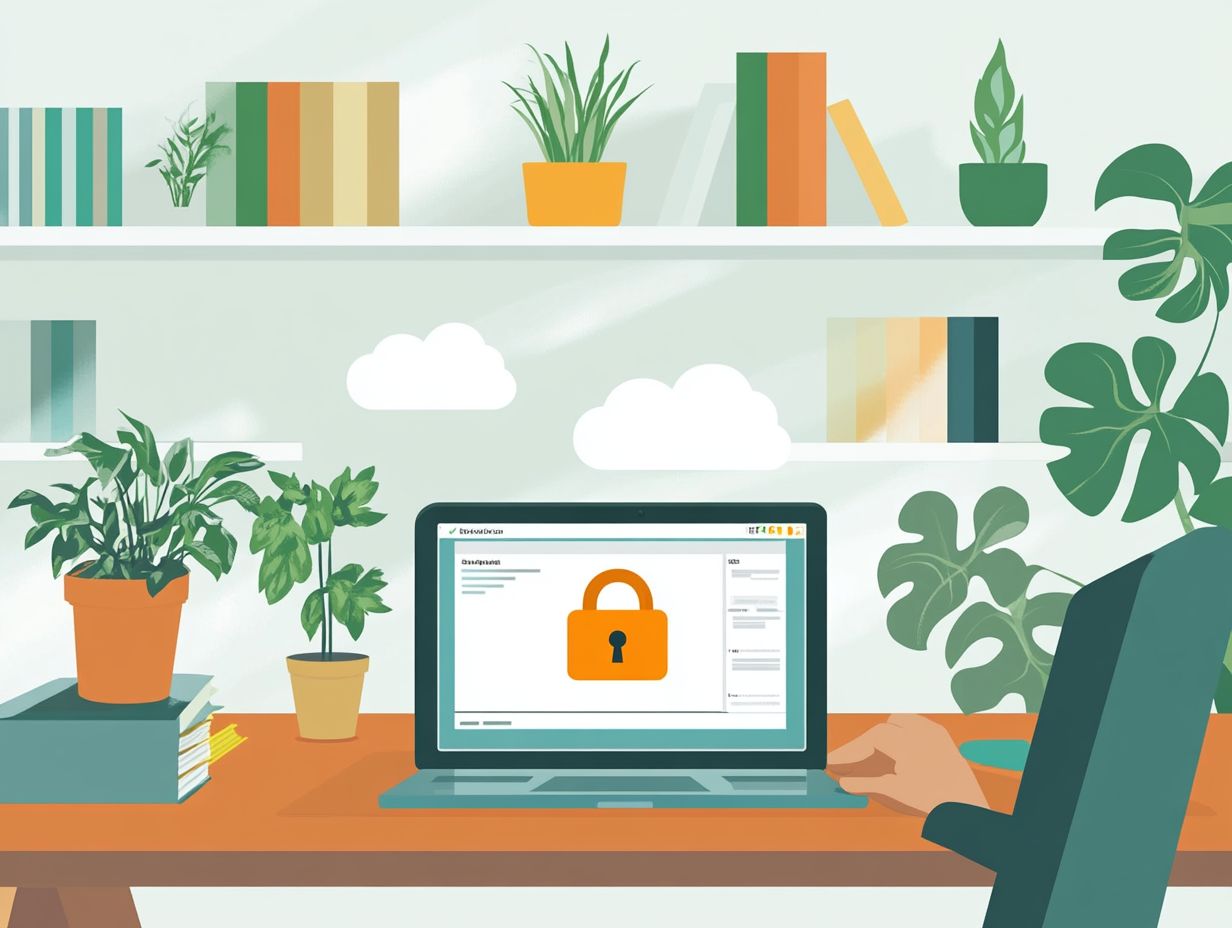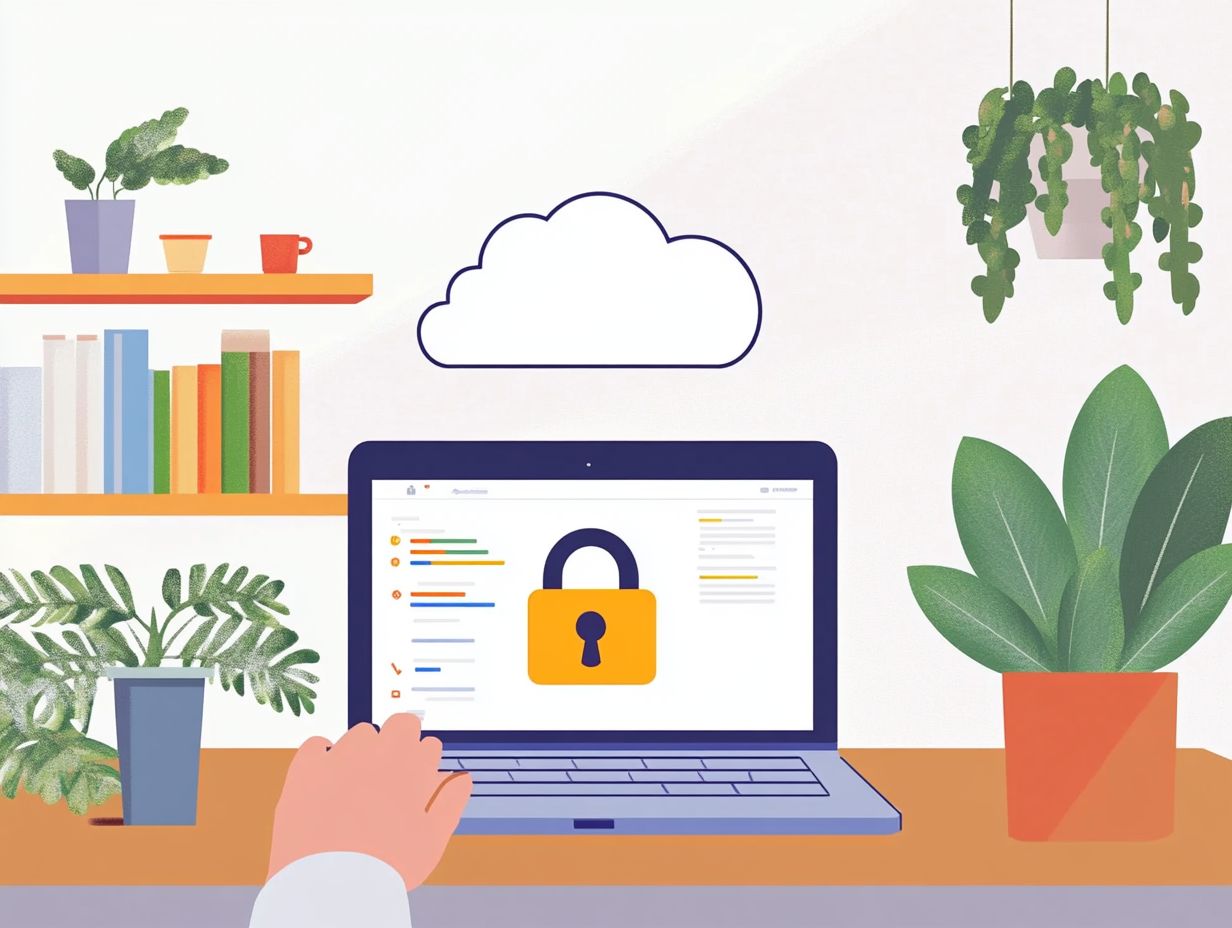How to Share Files Securely via Cloud Storage
In today s digital landscape, cloud storage has revolutionized the way you share files. With its convenience and cost-effectiveness, it empowers you to access important documents from virtually anywhere with an internet connection.
Yet, it s crucial to recognize that security risks are part of the equation. This article delves into the advantages of cloud storage for file sharing, the potential threats you might encounter, and best practices to ensure your data stays secure.
You’ll also discover alternative methods for sharing files safely. So, join us and discover how you can protect your information while enjoying the benefits of cloud storage!
Contents
- Key Takeaways:
- Benefits of Using Cloud Storage for File Sharing
- Security Risks of File Sharing via Cloud Storage
- Best Practices for Secure File Sharing
- Alternative Options for Secure File Sharing
- Frequently Asked Questions
- What is cloud storage and why should I use it to share files securely?
- What are some popular cloud storage options for sharing files securely?
- How do I ensure the security of my files when sharing them via cloud storage?
- Can I limit the access of others to the files I share via cloud storage?
- What should I do if I accidentally share a file with the wrong person via cloud storage?
- Is it safe to share sensitive documents and personal information via cloud storage?
Key Takeaways:

Convenience and accessibility are key benefits of using cloud storage for file sharing. It allows for easy access and sharing of files from anywhere at any time.
Choose a secure provider and use strong passwords to protect your data. Security risks are a potential concern when sharing files via cloud storage.
Alternative options for secure file sharing include encrypted email and file transfer services, as well as virtual private networks (VPNs). These can provide an extra layer of security for sensitive files.
What is Cloud Storage and How Does it Work?
Cloud storage is a game-changer, allowing you to save and access your data via the internet rather than relying on local storage. This technology facilitates secure file sharing for your personal documents and sensitive information.
It operates with file transfer protocols such as SFTP (Secure File Transfer Protocol) or FTPS (File Transfer Protocol Secure), ensuring that your data is transferred securely while adhering to important data privacy regulations such as HIPAA and GDPR.
With remote access capabilities, you can conveniently reach your files from anywhere with an internet connection whether you re navigating the hustle and bustle of an office or lounging in the comfort of your home.
The importance of end-to-end encryption simply cannot be overstated; it means that only you and the person you re sharing with can read the data. Not even the provider can access it. This protects your data both during transit and while it rests on cloud servers.
Providers like Google Drive and Dropbox come equipped with strong security options, but options like Proton Drive take privacy to the next level with a zero-knowledge policy, meaning even the service provider can’t access your data. Compliance with data privacy laws is essential, especially for businesses dealing with confidential information. This not only builds trust but also offers a safeguard against potential breaches.
Benefits of Using Cloud Storage for File Sharing
Utilizing cloud storage for file sharing presents a wealth of benefits, enhancing both convenience and accessibility.
You can effortlessly share sensitive information through secure links, whether you re connected to public WiFi or a private network. This modern method simplifies document sharing. It also saves you money compared to traditional ways like using physical storage.
Convenience and Accessibility
One of the primary advantages of cloud storage lies in the unparalleled convenience and accessibility it offers you, allowing for instant file sharing through secure links, even when you re connected to public WiFi networks.
This functionality gives you the power to set flexible sharing time limits, making it simpler to control access to your sensitive information.
By taking advantage of these advanced features, you can not only keep your data safe but also maintain oversight of who accesses your files and for how long.
Having this level of control is crucial today. The ability to monitor file activity in real-time enhances accountability and enables you to spot any unauthorized access attempts.
Ultimately, the comprehensive suite of tools provided by cloud storage solutions encourages secure file sharing, fostering a collaborative environment while protecting your vital information from potential threats.
Cost Savings
Switching to cloud storage for file sharing can yield impressive cost savings. You no longer need to rely on physical media like removable storage, and you can avoid expenses tied to email attachments with size limitations.
Streamlining your data storage and sharing through cloud solutions is more economical in the long run.
By embracing cloud technology, you significantly reduce your dependence on expensive hardware. The responsibility for maintaining servers or backup devices shifts to the cloud service provider, freeing you from those burdens.
This transition reduces your capital expenditure on equipment and lessens ongoing maintenance and upgrade costs. In fact, a survey indicates that businesses can save as much as 30% annually by moving to cloud storage.
Cutting transportation costs linked to physical data transfer is a significant advantage. With remote file access, you enhance productivity and collaboration while avoiding logistical headaches related to hardware management.
Security Risks of File Sharing via Cloud Storage

Cloud storage offers many advantages for file sharing, but it also presents security risks that require careful attention, especially for sensitive information.
Be aware of the potential security challenges, including:
- Insufficient encryption
- Non-compliance with data privacy regulations like GDPR and HIPAA
- The risk of unauthorized access
Potential Threats and Vulnerabilities
File sharing through cloud storage can expose you to threats that jeopardize sensitive information, including data breaches and phishing attacks. Providers that don’t prioritize privacy may have inadequate security measures. To enhance your security, implement two-factor authentication and choose privacy-focused providers.
Stay aware of risks associated with unauthorized access, ransomware, and insider threats that can impact data integrity and user trust. Keeping your software updated and monitoring access logs adds another layer of protection.
Encourage the use of strong, unique passwords resistant to common attacks to further strengthen your security.
By incorporating these practices into your routine, you diminish exposure to widespread risks, effectively safeguarding your data and enhancing your security stance against evolving threats.
Best Practices for Secure File Sharing
To ensure secure file sharing through cloud storage, adhere to best practices. This includes using strong passwords and employing a method that protects your files from being accessed by anyone but you.
Selecting a privacy-focused provider is also critical, as it ensures that your sensitive information is handled carefully and that data privacy regulations are followed.
Choosing a Secure Cloud Storage Provider
Selecting a secure cloud storage provider is crucial for effective file sharing. You need a provider that prioritizes your privacy and complies with data privacy regulations like GDPR and HIPAA. This choice is vital for safeguarding sensitive information throughout its lifecycle.
As you evaluate your options, pay attention to features like end-to-end encryption, which ensures your data is protected from unauthorized access at every stage. Compliance with standards reflects a commitment to legal obligations regarding user data.
Consider providers like:
- Proton Drive, which offers robust encryption and a privacy-centric approach.
- Dropbox, known for its user-friendly interface but with potentially less stringent encryption.
- iCloud, which integrates well with Apple devices, though it requires careful examination of security features.
A comprehensive comparison empowers you to make informed decisions about your cloud storage needs, ensuring your data remains secure and compliant.
Implementing Strong Passwords and Encryption
Implementing strong passwords and end-to-end encryption is essential for secure file sharing. These measures ensure your sensitive information remains confidential and accessible only to those you intend. They significantly reduce the risk of unauthorized access and enhance overall data security.
Think of strong passwords as your first line of defense against cyber threats. It is vital to use a mix of letters, numbers, and symbols while avoiding easily guessable information. Adding multi-factor authentication is like putting an extra lock on your door it’s another layer of protection.
End-to-end encryption keeps your data safe while it is sent, ensuring it remains unreadable to anyone except the intended recipient.
You can supercharge your communications by regularly updating passwords and using reputable encryption tools. Together, these strategies establish a robust framework that protects your information at rest and in transit from potential breaches.
Alternative Options for Secure File Sharing

If you are looking for alternatives to traditional cloud storage for secure file sharing, consider options like encrypted email and dedicated file transfer services.
Virtual private networks (VPNs) also add valuable layers of security. These methods are particularly advantageous for individuals who frequently share sensitive information over peer-to-peer networks or public WiFi, ensuring your data remains protected.
Encrypted Email and File Transfer Services
Encrypted email and file transfer services present robust alternatives for secure file sharing, especially for sensitive information during transmission.
These tools encrypt your data, ensuring that only authorized recipients can access the files. This process transforms your message into a format that is unreadable to anyone lacking the correct decryption key, making it virtually impossible for unauthorized users to intercept and decipher your information.
The significance of email encryption is critical, especially when exchanging confidential documents. A growing number of file transfer services emphasize security features like end-to-end encryption, secure access protocols, and compliance with regulatory standards.
By utilizing these services alongside cloud storage, you safeguard your data while improving ease of access, allowing for seamless collaboration.
Virtual Private Networks (VPNs)
Using virtual private networks (VPNs) is a smart strategy for secure file sharing, especially on public WiFi. VPNs create a secure connection for your data, significantly boosting security against potential cyber threats and ensuring that strong passwords are not your only line of defense.
This additional layer of encryption safeguards your sensitive information from hackers who often target unsecured networks. By masking your IP address, VPNs help maintain your anonymity, making your browsing and communication safer.
Employing a VPN alongside strong passwords and end-to-end encryption establishes a comprehensive security framework. Together, these measures ensure that even if your data is intercepted, it remains unreadable and secure, granting you peace of mind when sharing files online, especially in vulnerable environments like cafes or airports.
Frequently Asked Questions
Cloud storage is a service that allows you to store and access data over the internet. It is a convenient way to share files securely because it eliminates the need for physical storage devices and allows easy access from any device with an internet connection.
Start securing your files today using these methods!
What are some popular cloud storage options for sharing files securely?

Dropbox, Google Drive, OneDrive, and Box are popular cloud storage options for sharing files securely. Each of these services offers different security levels and features.
How do I ensure the security of my files when sharing them via cloud storage?
Use a strong, unique password. Enable two-factor authentication, a security feature that requires a second way to verify your identity. Share files only with trusted individuals and encrypt sensitive files before uploading them.
Yes, you can control who can view, edit, or download your shared files. You can also revoke access at any time.
Immediately revoke their access and ask them to delete the file. Change your password for extra security.
Cloud storage services have security measures, but always be cautious. Encrypt files before uploading them and share only with trusted individuals.






